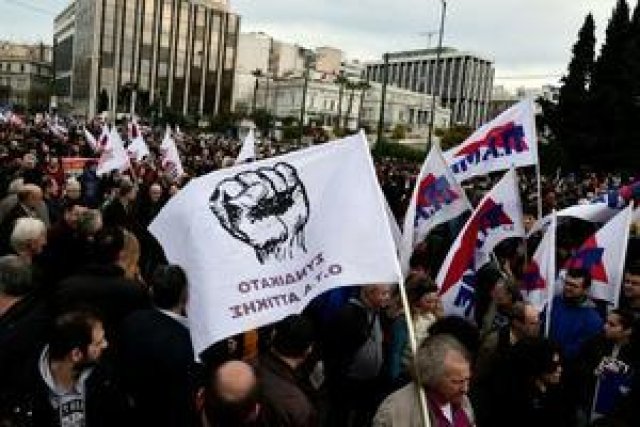
A 24-hour general strike in Greece against the “odious plan to dismantle the country's social security system” shut down transportation, schools, courts, pharmacies and non-emergency hospital services on February 4.
Up to 100,000 people attended, according to organisers, while police estimated 50,000 hit the Athens streets. The strike is the largest since the leftist Syriza party took power in January last year on a platform of opposing the type of austerity measures the strike targetted.
A 24-hour general strike in Greece against the “odious plan to dismantle the country's social security system” shut down transportation, schools, courts, pharmacies and non-emergency hospital services on February 4.
Up to 100,000 people attended, according to organisers, while police estimated 50,000 hit the Athens streets. The strike is the largest since the leftist Syriza party took power in January last year on a platform of opposing the type of austerity measures the strike targetted.
"We will reach a stage where we won't be able to make ends meet unless we steal from the state, hide income," said 70-year-old demonstrator George Stathopoulos. Critics estimate that Greeks may lose up to two thirds of their income to the reforms — if they don't evade the taxes.
Some of the demonstrators — thousands of them anarchists — threw Molotov cocktails and stones at police, who threw tear gas back.
Signs made reference to the “OXI” vote in July against the austerity conditions demanded by the third bailout of European Troika. To satisfy creditors, Syriza Prime Minister Alexis Tsipras must cut 1.8 billion euros from pensions — already cut 11 times since 2010. Avoiding another cut, the government is increasing taxes and contributions to fund social security.
The International Trade Union Confederation announced the solidarity of its 180 million members with the Greek strike, called by the General Confederation of Greek Workers.
In a statement, the ITUC said that the government's refusal to consult the trade unions violated International Labor Organization conventions. It called for Greece to freeze the reforms until meeting with union representatives, “the only way to foster social peace and help to create an enabling environment for the realization of economic performance that can lift Greek people out of poverty.”
The demands of the Greek unions were more expansive; they included protecting and enhancing state-owned enterprises, reforming the tax system and introducing more benefits for workers and pensioners.
“After six years of failed austerity policies imposed on Greece and of a merciless attack against labour and social security rights, workers, pensioners, the unemployed and the young people of our country are made to pay a heavy price for the harsh measures of the third bailout agreement, the 3rd Memorandum,” said a statement from the General Confederation of Greek Workers.
[Reprinted from TeleSUR English.]
Like the article? Subscribe to Green Left now! You can also like us on Facebook and follow us on Twitter.